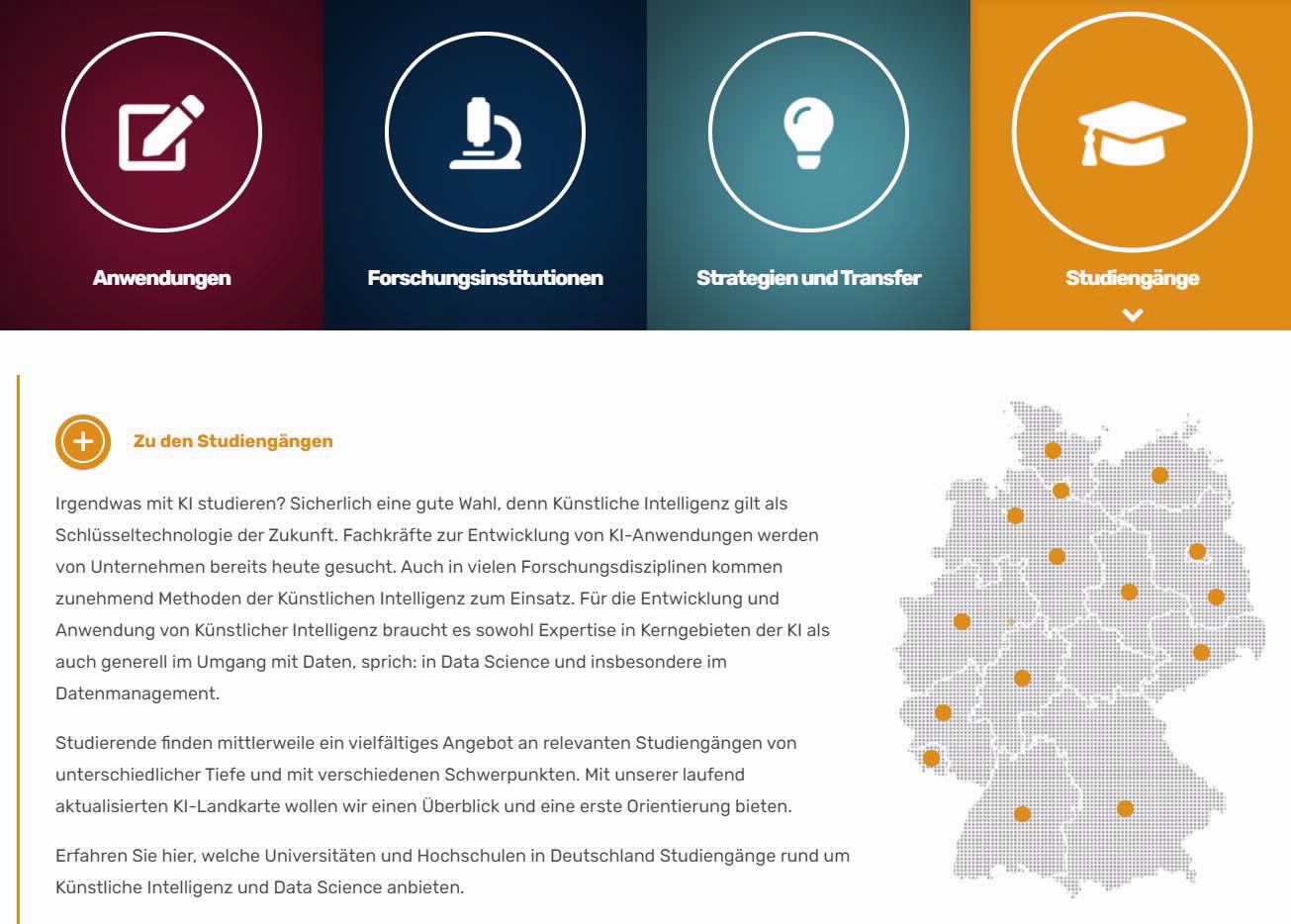Something with AI and data: Plattform Lernende Systeme gives overview of study programmes

Munich, 06 November 2020
Artificial Intelligence (AI) is considered a key technology of the future and will increasingly become part of industrial and private software applications. Closely linked to the development of AI systems is the preparation and analysis of existing data, called data science. This is a future-oriented field of work for high school graduates. The interactive AI map of Plattform Lernende Systeme now shows at which universities in Germany they can find courses of study that focus on AI and data science or only deal with some of them.
Artificial Intelligence is the next stage of digitisation. We already use it today via speech assistants or navigation devices. In the future, learning systems in medicine, mobility, production, marketing and many other industries and value-added stages will support people at work. There is a great demand for well-trained specialists, and companies are already looking for specialists to develop AI-based systems. AI methods are also increasingly being used in research – be it in pharmaceuticals, medicine or earth observation – to gain new insights from large amounts of data.
The development of innovative AI systems requires expertise in both AI methods and data handling. More precisely: in the collection, processing, preparation and analysis of large amounts of data (data science). But where can interested parties find suitable degree programmes in Germany? The AI map of Plattform Lernende Systeme (www.ki-landkarte.de) provides an overview. Under the new heading “Degree Programmes”, it lists 170 universities across Germany that offer degree programmes in AI and Data Science.
Filtering by thematic focus
Various filter functions facilitate the search for an individually suitable degree programme. In addition to the type of higher education institution (university or university of applied sciences) and degree (Bachelor’s or Master’s), degree programmes can also be selected according to their orientation (Artificial Intelligence or Data Science), denomination and their location in the department. In addition or alternatively, filtering according to seven main content areas (perception, machine learning, robotics and interaction, speech processing and text comprehension, knowledge, data analysis and data management) is possible.
“With our continuously updated AI map, we want to offer prospective students an overview and initial orientation in their search for a suitable degree programme in the technology fields of Artificial Intelligence and Data Science,” says Johannes Winter, Head of the Office of Plattform Lernende Systeme. “Well-trained specialists are the fundamental prerequisite for Germany to maintain its good starting position in the development of AI technologies and to remain internationally competitive in their transfer to industry”.
On its map of AI, Plattform Lernende Systeme, which is funded by the Federal Ministry of Education and Research (BMBF) and based at acatech, uses various view options to make visible which research institutions in Germany are involved with AI, where AI applications are already in use nationwide, what political framework is set by the federal and state governments and where companies can find support in transferring them into practice. The new tab “Study programmes” completes this nationwide overview.
The data basis for the degree programmes listed on the AI map is the Higher Education Compass of the German Rectors’ Conference (Hochschulrektorenkonferenz – HRK). This was filtered via a broadly based list of selectors. The categories “subject”, “field of study” and “major field of study” included in the Higher Education Compass were then checked for indicative terms referring to study contents from the fields of Artificial Intelligence and Data Science. The result was supplemented by own research.
The importance of data science for AI development is highlighted in two publications on the Plattform Lernende Systeme:
- Working paper “Data Science: learning and training content”: https://www.plattform-lernende-systeme.de/files/Downloads/Publikationen/GI_Arbeitspapier_Data-Science_2019-12_01.pdf
- White paper From Data to AI



